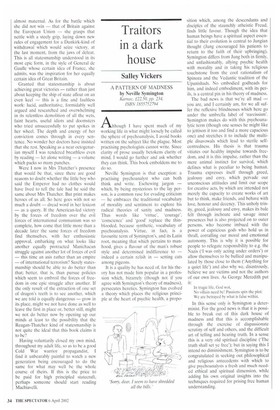The painful warrior famous for might after a thousand victories
Peregrine Worsthorne
STATECRAFT by Margaret Thatcher
HarperCollins, £25, pp. 486, ISBN 0349115281
Statecraft at one relatively lowly level is the craft of making the best of a bad job and although Mrs Thatcher, in this her latest, and possibly her last, major work, does not have much, or indeed anything, to say on this aspect of her subject, she certainly practised it, as any statesman worth his salt from time to time — even de Gaulle in Algeria — is bound to do. So there is no mention, for example, of the miserable settlement she had to negotiate, faute de miewc in Zimbabwe when she transferred power into the already bloodstained hands of President Mugabe. No, this is definitely not a book about that kind of statesmanship — the kind which amounts to little more than putting right
the mistakes made by earlier statesmen — but rather a book about the kind of high principled statesmanship, aimed at imposing the morally right solution rather than merely the most expedient, of which she herself claims several historic triumphs: the first in the free world's victory over totalitarianism in the 50-year Cold War and the second in the conclusive victory of capitalism over socialism.
So far as I can judge there is not much new material in her account of these famous victories, although this does not in any way diminish the pleasure of reading about them, any more than a lack of new revelations diminishes the pleasure of rereading Caesar's famous account of how he conquered Gaul, Nor, fortunately for the readers, does Mrs Thatcher believe in abiding by Churchill's rule about magnanimity in victory, since she deftly and devastatingly lands lots of verbal body blows on all those in the West who gave aid and comfort to the communist enemy. On the other hand she is notably generous in giving much of the credit for winning the Cold War to President Reagan about whom she writes with a depth of affection which is almost maternal. As for the battle which she did not win — that of Britain against the European Union — she grasps that nettle with a steely grip, laying down new rules of engagement for a Dunkirk-kind of withdrawal which would seize victory, at the last moment, from the jaws of defeat. This is all statesmanship understood in its most epic form, in the style of General de Gaulle whose certain idea of France. she admits, was the inspiration for her equally certain idea of Great Britain.
Granted that statesmanship is about achieving great victories — rather than just about keeping the ship of state afloat on an even keel — this is a fine and faultless work: lucid, authoritative, formidably well argued and researched and overwhelming in its relentless demolition of all the wets, faint hearts, useful idiots and doomsters who tried unsuccessfully to put spokes in her wheel. The depth and energy of her conviction comes through in every sentence. No wonder her doctors have insisted that she rest. Speaking as a near octogenarian myself I was rendered breathless even by reading — let alone writing — a volume which packs so many punches.
Were I now in Mrs Thatcher's presence that would be that, since there are good reasons to doubt whether the little boy who said the Emperor had no clothes would have lived to tell the tale had he said the same about Mrs Thatcher. But print makes heroes of us all. So here goes with not so much a doubt — dread word in her lexicon — as a query. If the American-led victory by the forces of freedom over the evil forces of international communism was so complete, how come that little more than a decade later the same forces of freedom find themselves, with her enthusiastic approval, embarking on what looks like another equally protracted Manichaean struggle against another lot of forces of evil — this time an axis rather than an empire — of international terrorism? Surely statesmanship should be able to do better than that; better, that is, than pursue policies which seem to embroil the forces of freedom in one epic struggle after another. If the only result of the extraction of one set of dragon's teeth is to see another, which we are told is equally dangerous — grow in its place, might we not have done as well to leave the first in place or, better still, might we not do better now by opening up our minds at least to the possibility that the Reagan-Thatcher kind of statesmanship is not quite the ideal that this book claims it to be?
Having voluntarily closed my own mind, throughout my adult life, so as to be a good Cold War warrior propagandist, I find it unbearably painful to watch a new generation being encouraged to do the same for what may well be the whole course of theirs. If this is the price to be paid for high principled statecraft, perhaps someone should start reading Machiavelli.































































 Previous page
Previous page